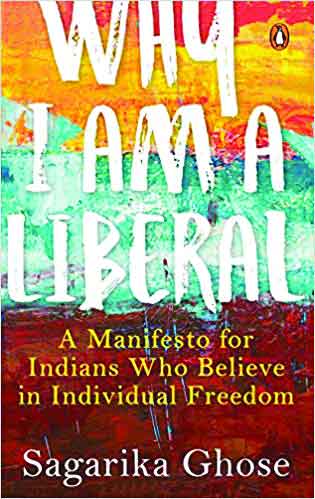Why I Am a Liberal
Author : Sagarika Ghose
Publisher : Penguin Viking, Rs 500
This book is a fitting tool to help readers analyse their own politics as individuals and assess the practicability of a ‘liberal stand’, says VV Sundar
The thing about labels is that they try to do the impossible — they create neat classifications and build definitive boundaries and restricted identities/meanings. In reality, this stratification often fails to stick. Another problem is that times, labels derive meaning and respectability only when they are used to lampoon or attack the ‘Other’ ideology.
The codification in politics is fascinating. The protagonists change from time to time. Left, right, liberal and fundamentalist are some of the common terms that are thrown around in the political spectrum. These are loaded, rigid and absolute words and tend to act as self-appointed gatekeepers. Each arrogates its own wisdom and methods as supreme, as compared to the other, to achieve their lofty goals. No counter narrative is permissible or tolerated.
Interestingly, one thing that is common in all camps is their undeniable hollowness when it comes to delivering the promises to the common man. Isn’t each camp drumming up hysteria against the other to favour its own ideology? Do these camps really matter? Does the man on the street view the world according to such neatly dissected frames of references? Or is the common man making deft choices that befit the immediate reality and context?
India’s social and political ecosystem is a perpetual tug of war. Issues related to caste and religion continue to plague its evolution. Sagarika Ghose’s recent book Why I Am a Liberal: A Manifesto for Indians Who Believe in Individual Freedom does a good job at discussing these factors.
It is a voluminous book that shows why a society as a whole can’t be viewed through the lens of the ‘right wing’ or the ‘left wing’. It also highlights the danger in the tendency of individuals buying into the idea that the Government should have a paternalistic role to play.
As for the writing style of the book, one finds the narrative shifting gears, often abruptly as it goes from quoting the past to chronicling the present and then going back again to the past, to reinforce the central argument. So at times, the ride might seem to be somewhat bumpy. But it is still a good read for the arguments that it makes. The central idea that it revolves around is: Respect for disagreement is an extremely important liberal premise. One can’t help but wonder that if individual freedom is what is being championed then why at an aggregate level, when delivered in the form of electoral verdicts, it remains an unpalatable idea to a section of the intelligentsia when the results challenge their advocated narrative? Why we do not view the electoral verdicts and the freedom exercised by other individuals with respect and humility?
The book talks about “muscular nationalism” becoming the norm. Why has it emerged in the first place? Is it a manifestation of geo-political events or of certain perceived weaknesses left unaddressed from the past? It also states that “It is also a time to be inclusive, to listen to counter arguments and learn from them and recognise that the term ‘liberal’ has been distorted and corrupted by its own guardians”. That is remarkably a candid admission.
The book devotes a lot of space to the deep liberal traditions in India and shows how the founding fathers’ vision of the country was a thoroughly liberal one. In that case, the people of the nation should have been allowed to exercise their own political beliefs, even if they do not fit the liberal camp or other ideological camps. The liberalism at the core of the country is stronger than the forces of aggression, accession and aversions around it.
This is definitely a well-researched book. It works both for and against the author that in a single page, the reader gets to travel through space and time. He/she gets to look at events and personalities from a fresh perspective in this process. The book passionately advocates that individual freedom is above all else. Individuals, however, often have to navigate through the intricately woven fabric of said and unsaid rules in a society. Caste, class, and religion-related issues often form the bedrock of political decision making.
Also, individuals in a society often have to carry the burden of the decisions that have been made for them in the past. We don’t always get to choose our realities. In India, groups of individuals have often rejected any kind of ideological excess and have been able to see through hollow promises.
To some readers, it might seem like this is one of those books that are full of ideological gobbledygook, unconnected to the man on the street. But, I would still suggest that you pick it up as it helps one understand socio-political forces and shows that liberalism should not be limited to taking seemingly liberal stands while participating in a living room discussion.
The writer is a communications and management professional


























